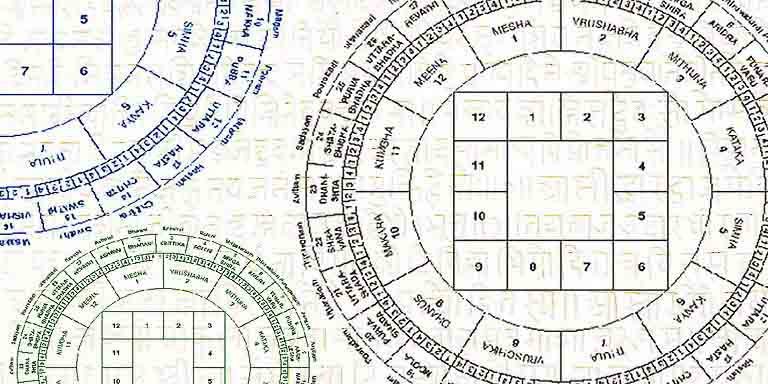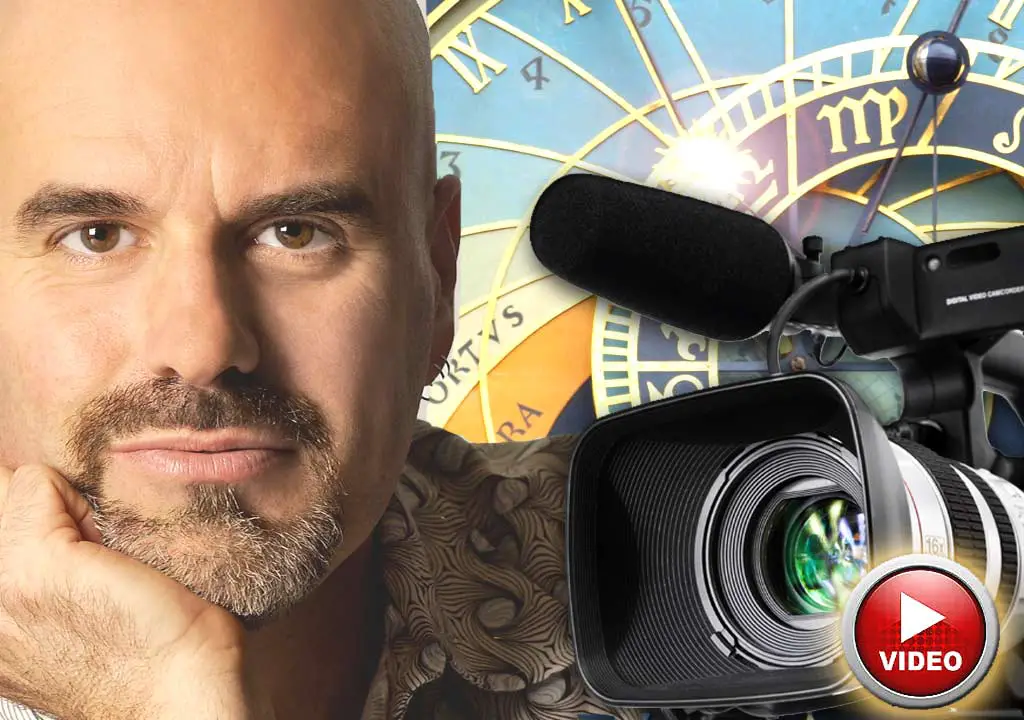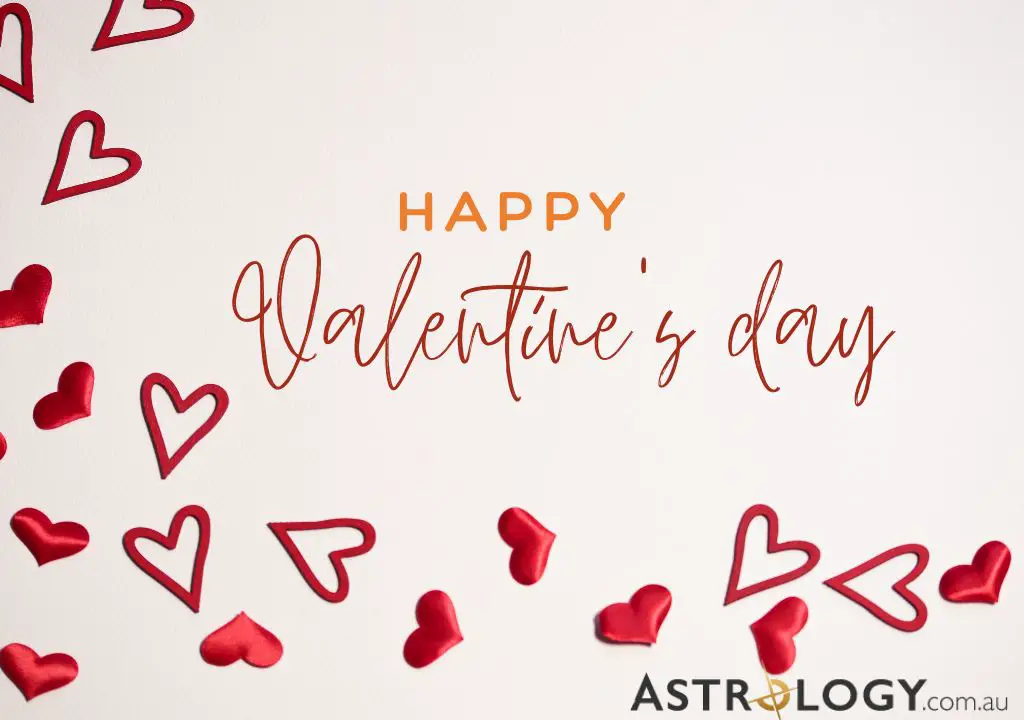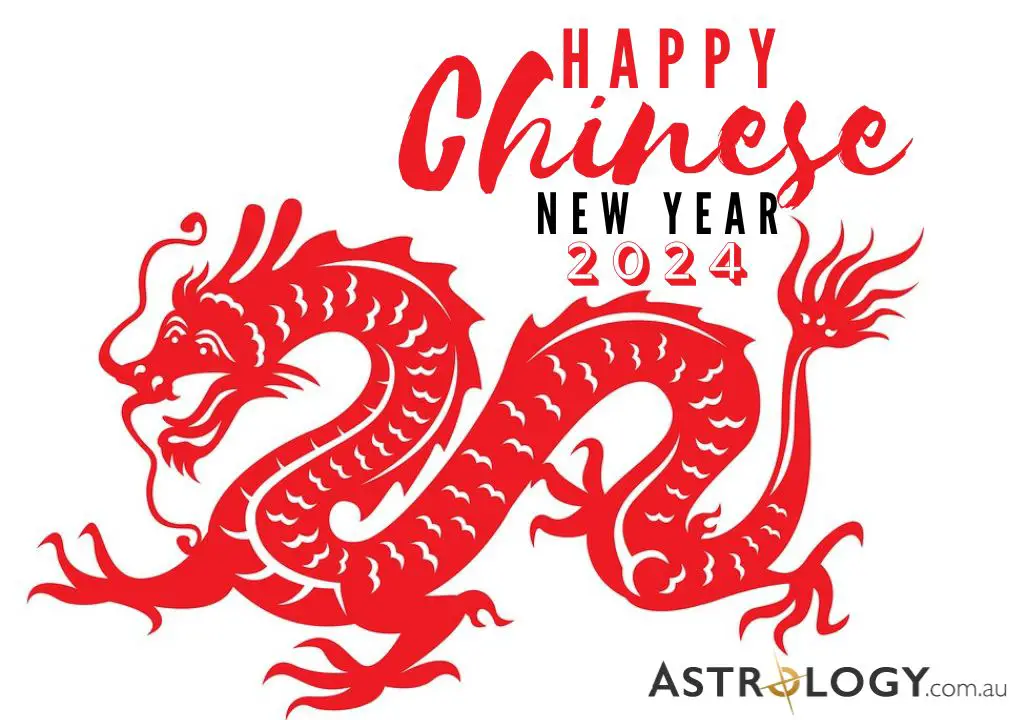The Traditional Hindu System of Astrology
In Sanskrit, the word Jyotish is a combination of the words Jyoti, meaning light and ishta, meaning deity. It is therefore loosely interpreted as the study of the Sovereignty of “Light”. The Power of God’s Energy and Will is reflected in the configurations of the heavenly bodies. Just as storm clouds symbolize impending rain, so too are the patterns of planets and stars a glimpse of things ordained for humanity, both individually and collectively.
A deeper implication of the word Jyotish though is the light of intuition. Without this blazing flash of insight, astrology remains largely a technical maze. An astrologer or Jyotishi should also possess an inner light or intuition for correct analysis and prediction. This is why most Jyotishis utilize a personal deity or subtle guide in perfecting their inner psychic abilities. This light is the substratum of the Universe and all life and is the underlying power behind all celestial movement.
RELATED: YOUR FUTURE IS YOUR DESTINY…GET YOUR PERSONALIZED FORECAST HERE!

During the recent past, as a natural consequence of the hippy subculture of the 1960’s and early 1970’s, the pseudo-mystic interpretations of such eastern traditions as Hinduism and Buddhism have flourished profusely in the West.
The doctrines of karma, reincarnation, out of body experiences and other esoteric sciences have become increasingly popular with the masses. So, too, have misinterpretations of these subjects. Though astrology has long sought to provide truth and a solid foundation of understanding in the mysteries of karma and the soul’s transmigration, its depiction in tabloid publications has completely distorted its value in satisfying the spiritual and evolutionary needs of hungry souls.
The original Vedic authors divulged the principles of Sidereal astrology to their deserving pupils in an age-old oral tradition. They regarded the celestial movements and their relationships to predictive issues as only a very small part of the real intention of astrology. In all authentic texts of the Vedic astrological tradition, every author, without exception, commences his work with a salutary verse to the Spirit within all things. An honour and worship to the life within the planets to the Abstract Intelligence, impelling all beings in the Universe to act and perform Karma.
Sage Varahamahira in BrihatJataka in chapter one, Stanza one, starts by invoking.
‘The Sun, who is one of the eight deities of Shiva, who forms the path for those who go to the final beatitude of liberation, who represents the highest spiritual self for those well versed in Spiritual Self, for those well versed in Spiritual Sciences, who accepts the results of sacrificial rites, who is the master of the angelic beings and duties, as well as planets and stars; who creates, protects and destroys the many worlds and planes of existence, who is praised in the sacred vedic scriptures in various forms, who is possessed of many rays and who is the light of the three worlds…may He grant us speech’ as does Mantreshwara in Phaldeepika say – ‘May we be blessed with beatitude without end by that Supreme Reality – the one Heavenly light without a second (the Sun) …’
From these and other reputed authorities of Jyotish (Vedic astrology) it is obvious that the predictive, even delineative aspects of character, personality, and destiny, all fall within the context of a vaster more panoramic view of astrology and the evolution of the soul. In short, astrology is a tool for studying the evolutionary blueprint of an individual.
From this perspective, it is the aggregate of karmas, both good and otherwise, that are sought, with a view to balancing them and finally transcending the endless cycle of births and deaths.
The word karma conjures up so many misconceptions and is rarely understood. The doctrine of action and reaction and its application simply to external modalities often overlooks the subtle and more relevant detail of motive. It’s again in these hidden areas of human nature that astrology excels in revealing our intention within and therefore the path we actually follow and the likely repercussions in this and future lives.
Vedic tradition, three primary attributes in nature
According to Vedic tradition, there are three primary attributes in natureRajas or passion and activity
- Tamas or inertia and immobility
- Sattva or harmony and goodness
- Sattva or harmony and goodness
Four basic motivations or aims of human nature
There are also four basic motivations or aims of human nature. Including:
- Dharma or the execution of duty or law through meaningful work.
- Artha or the acquisition of wealth and material security.
- Kama or desire for emotional and sensual enjoyment.
- Moksha or the culmination of spiritual endeavour and the transcendence of the cycle of karma and transmigration.
All four aims of life are accepted synergistically as a means of securing fulfilment and peace. The fourth, Moksha, is given priority in the scheme of human endeavour and infuses spirituality to the other three ‘material’ activities of man ( by sublimating and directing these other activities to asupra-mundane goal, the other three become spiritualised ).
These three attributes and four aims can also be used to categorize and define more clearly the 12 signs of the zodiac. In this manner, each sign is seen as a successive stage in your process of evolution to the final state of perfect Self-knowledge. Your focus and path may also be experienced more fully by gaining a greater knowledge of your birth sign.
The Sattvic or harmonious planets are Mercury and Jupiter. Rajasic or mobile planets are, Sun, Moon and Venus and the Tamasic or inert planets being Mars, Saturn, Rahu (Moon’s North Mode) and Ketu (Moon’s South Mode). According to this scheme, therefore, the twelve signs of the zodiac, each ruled by the planets, are categorized as follows by their attribute and also their motivation.
Aries – Tamasic Dharma
Taurus – Rajasic Artha
Gemini – Sattvic Kama
Cancer – Rajasic Moksha
Leo – Rajasic Dharma
Virgo – Sattvic Artha
Libra – Rajasic Kama
Scorpio – Tamasic Moksha
Sagittarius – Sattvic Dharma
Capricorn – Tamasic Artha
Aquarius – Tamasic Kama
Pisces – Sattvic Moksha
The Zodiac is therefore divided motivationally by the elements. The fire signs of Aries, Leo and Sagittarius constitute the Dharma or duty impulse. The earth signs of Taurus, Virgo and Capricorn represent the Artha or wealth impulse. Gemini, Libra and Aquarius indicate the kama or pleasure principle and Cancer, Scorpio and Pisces, Moksha or occult and spiritual pathways.The process of re-incarnation and karma may be evaluated by scrutinising the geniture (horoscope) of an individual. The predominance of planets in, for example, Kama signs would indicate a current incarnation tending towards desire and fulfilment of a passionate nature. Depending on the strength and other dignities of the planets in question, the use of these energies, and whether or not spiritual growth would result, is then ascertained.
The categorisation of human beings is not exactly a cut and dry process, as is generally being presented. Each zodiac sign in unique and the myriads of combinations need to be carefully balanced to assess the karmic grade of the present life. Of course, current high grades may not necessarily ensure high grades in future births. The resultant karmas and their exhaustion need to be analysed to see what benefits or lapses will accrue at the end of this incarnation. As we successively evolve through series of lives, we associate with the star signs under which we are born. In fact we express those very qualities inherent in the cosmic patterns.
For those who wish to compare their own Western and Vedic personality traits, the approximate Sun sign dates are as follows. The Sun positions vary only one day per 72 years and so these dates are more or less valid for those born after the 2nd quarter of this century.
Aries Apr 14th to May 14th
Taurus May 15h to Jun 14th
Gemini Jun 15th to Jul 15th
Cancer Jul 16th to Aug 17th
Leo Aug 17th to Sep 16th
Virgo Sep 17th to Oct 17th
Libra Oct 18th to Nov 16th
Scorpio Nov 17th to Dec 15th
Sagittarius Dec 16th to Jan 14th
Capricorn Jan 15th to Feb 12th
Aquarius Feb 13th to Mar 14th
Pisces Mar 15th to Apr 13th
Please note that the dates for entry of the Sun into signs varies year by year due to precessional values and should be verified by a sidereal astrologer for your specific year of birth. It should be noted that Vedic astrologers primarily emphasise the Moon’s rather than the Sun’s position. The Moon is the principle of innate desire giving rise to action, and therefore karma.

More about VEDIC ASTROLOGY
-

Vedic Astrology
What is vedic astrology? Traditional hindu system of astrology, tradition and three primary attributes in nature.
-

Introduction to Vedic Astrology
Vedic sidereal astrology, differences between western & tropical astrology. Astrological date signs and ten planetary conditions.
-

Nashaktras
Lunar Mansions in hindu astrology. The 27 Nashaktras.
-

Studies in Vedic Astrology
Vedic astrology and it's technique.Use of Jamini Bhava and Arudha Pads in the determination of psychopathy
-

Vedic Planetary Healing
Planetary Healing with the planets. Ritual Technology: planetary vibrations & mantras, yagna & fire ceremony and yantras mandalas & talismans. Tantra- the ten goddesses or object of knowlege.
ASTROLOGY READINGS & REPORT
Latest from Astrology.com.au
All the latest News and offers for your well-being
















